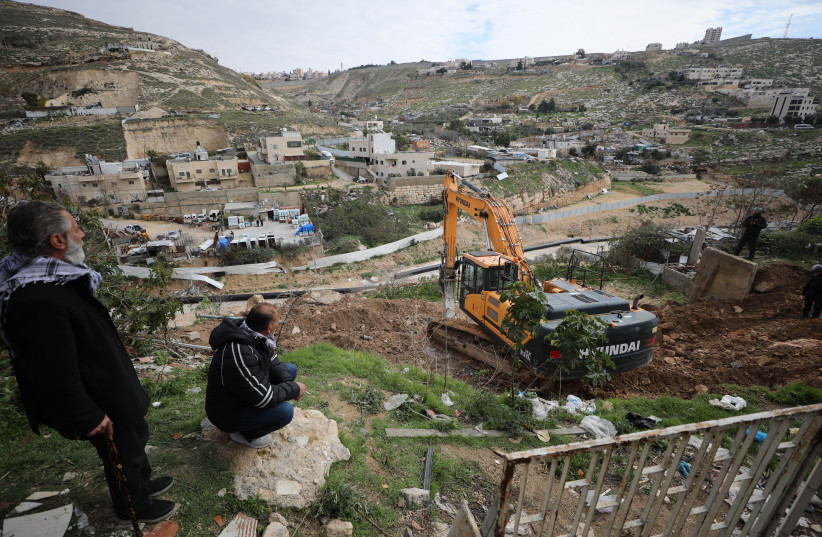Despite the government’s approval on Sunday allocating funds to a five-year plan for the development of east Jerusalem, Arab local authorities are embarking on a one-day strike Monday in response to Finance Minister Bezalel Smotrich’s decision to freeze municipal budgets to Arab communities.
National Committee for the Heads of Arab Local Authorities CEO Ameer Bisharat told The Jerusalem Post that the Jerusalem funding approval does not impact them at all. The strike is set to include the heads of 42 Arab authorities.
Israel’s Federation of Local Authorities will join their Arab communities in observing the strike, the chairman of the federation, Haim Bibas, announced on Sunday.
Speaking at an education conference in Baka al-Gharbiya, Bibas said that the holdup in NIS 3.2 billion earmarked for Arab municipalities was a blow to the weakest authorities, which are already on the verge of collapse.

“Violence and crime are uncontrolled and affect everywhere. The prolonged budget freeze leaves the authorities unable to function and provide services to their residents,” he said, according to Haaretz.
Arab mayors and council heads will hold demonstrations outside the Prime Minister’s Office and the Finance Ministry in Jerusalem in advance of an open-ended general strike set for September 1, the date that schools around the country are set to open.
Speaking after Sunday’s cabinet meeting, which approved NIS 3.2 billion for east Jerusalem education and development, Jerusalem Affairs and Jewish Tradition Minister Meir Porush (United Torah Judaism) said that it was Israel’s obligation to provide services for all citizens of Jerusalem
“The fact is that Israel is sovereign in east Jerusalem, and if so it must provide these services to the residents,” he said. “This step of bringing a special program for the development of east Jerusalem reveals the extent of the responsibility of all of us around this table to all who were created in the image of God,” he added.
The government’s approval comes two weeks after Smotrich announced freezing the proposed funding that was earmarked for economic development and education in the majority-Arab portion of the country. Smotrich at the time announced he was freezing the funding pending a checking mechanism in place that would ensure the funds are not misallocated.
His decision drew criticism from members of the governing coalition and opposition, who in a rare instance of bipartisanship spoke out against the finance minister’s move, citing everything from national security considerations and racism as his driving motive.
Concessions to ease Smotrich's fears
Sunday’s approval included concessions to ease Smotrich’s fear, including a committee that will comprise of the director-general of the Jerusalem Affairs and Jewish Tradition Ministry, a member from the Prime Minister’s Office, the head of the budget division at the Finance Ministry, the accountant-general, and the director-general of the Jerusalem Municipality, according to a summary provided by the government.
Following the approval at the government’s weekly cabinet meeting, where Smotrich entered alongside Prime Minister Benjamin Netanyahu and in clear good spirits, he said “We want to do it right. We want to make sure that these budgets reach their destination and not for other purposes, whether criminal elements, involvement of terrorism, incitement, and violence. The state closed its eyes on this matter, now we are putting an end to it.”
Netanyahu released a statement, as well, saying “Our government cares for all citizens and residents of the State of Israel, and it strengthens our policy in favor of a united and strong Jerusalem, under Israel’s sovereignty.
“That is why today we brought to the government a decision in favor of the residents of east Jerusalem, a very important decision; A decision to the extent of NIS 3 billion, a decision that will change the face of the city of Jerusalem.”
According to the prime minister, the newly approved plan will include funding from public infrastructure, reform of healthcare facilities, reform of welfare, increase in public security, employment opportunities, and working to increase the number receiving education certificates.
“We are building Jerusalem, we are strengthening the governance in Jerusalem, we are uniting Jerusalem,” Netanyahu closed.
Jerusalem Mayor Moshe Lion, who was in attendance at the government’s cabinet meeting, said afterward that “The decision made today is a sovereign decision. We are here today proving in practice that east Jerusalem is an inseparable part of Jerusalem.
“This five-year plan conveys an important message to the residents of the east, who in recent years have experienced a veritable revolution in all areas of life, especially in education.”
In terms of breakdown, NIS 736m. will go toward improving roads and public transportation, NIS 55m. to other public infrastructure, NIS 209m. will go toward increasing employment, including NIS 50m. towards Hebrew language education to the Arab sector, something they have reported to be heavily lacking.
There has been a large growth in efforts towards building up a hi-tech scene in the eastern part of the city, with projects such as Silicon Wadi and EastTech being notable ones. The funding will allocate NIS 48m. toward the encouragement of entrepreneurship, establishing start-ups, and helping residents find hi-tech jobs.
To combat a housing crisis in the area, they allocated NIS 133m. to building around 2,000 new apartments per year over the five-year plan.
Another NIS 100m. will go toward health care, NIS 120m. to welfare, NIS 90m. to sustainability, NIS 415m. for public spaces, and NIS 120m. for security.
A sore point in the outcry over Smotrich’s decision last week included funding towards education, particularly higher education preparatory programs. As such, NIS 800m. will go toward such programs.
